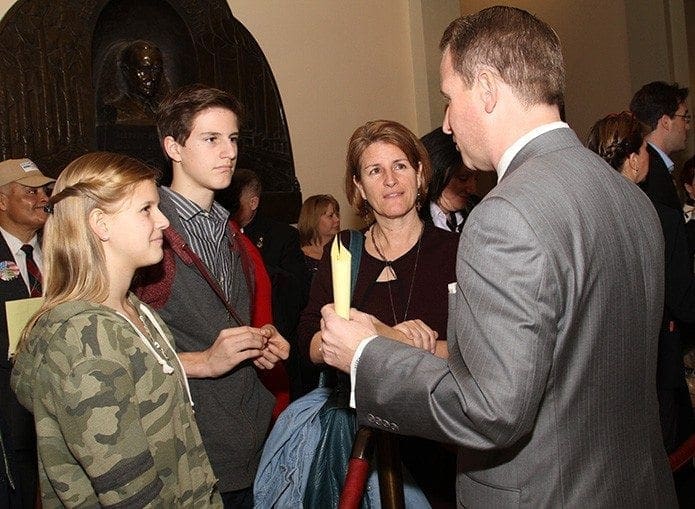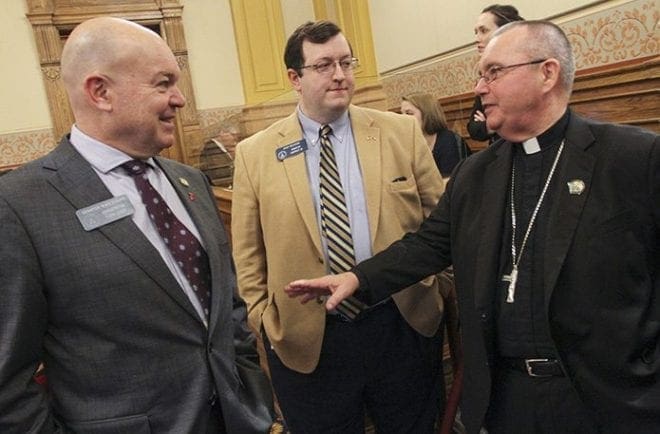 Photo By Michael Alexander
Photo By Michael AlexanderAtlanta
Curb on some death penalty cases motivates Catholics at Capitol
By NICHOLE GOLDEN, Staff Writer | Published February 19, 2016
ATLANTA—In a basement room of the Shrine of the Immaculate Conception in Atlanta, advocates gathered for prayer and a legislative briefing Feb. 4 to begin Catholic Day at the Capitol.
More than 50 people participated in this year’s program to meet with lawmakers who represent them in the Georgia General Assembly and to learn more about issues affecting the common good and legislation significant to the local Catholic dioceses.
The Georgia Catholic Conference organizes the annual event, which promotes faith in action. The conference represents the Catholic bishops of the Archdiocese of Atlanta and the Diocese of Savannah in the legislative arena.
Various ministry leaders joined conference director Frank Mulcahy to present updates on legislation already in the pipeline and bills yet to be introduced.
“We would like for you to talk with legislators about what you are passionate about,” said Kat Doyle, director of Justice and Peace Ministries for the archdiocese.
Doyle reminded participants that there are hundreds of bills before legislators at any given time, and often they don’t have time to read all of them. On a previous Catholic Day at the Capitol, one couple spoke to their legislator to encourage support of a fetal pain bill. While she supported pro-life bills, the lawmaker had not heard from any constituents about the fetal pain legislation.
“She was not aware of the bill and this couple asked her to vote for it,” said Doyle. “She voted ‘yes.’ That’s how important one or two people can be in the legislative process. This is your opportunity to be heard.”
During the briefing, participants received forms to communicate with their representatives in the event a face-to-face meeting was impossible.
Doyle urged the advocates to continue communicating with elected officials beyond the session.
“This is one day. Our faith calls us to live this every day,” she said.
Doyle also reminded the group that because the church does not take a position on every bill, it’s important for the faithful to research issues and look at proposals through the lens of Catholic social teaching.
Fueled by coffee and doughnuts, the Catholic Day participants split into several groups to walk one block to the Capitol. Later, they visited the Senate gallery to watch the session, stopped for a photo with Bishop David P. Talley and Gov. Nathan Deal, and had conversations with their respective representatives.
Sen. Mike Dugan of Carrollton, who attends Our Lady of Perpetual Help Church, welcomed Bishop Talley officially and introduced him to the Senate.
“Why are we insistent on being the worst?”
For Mississippi native Ann Basile, it was her first trip to the state Capitol.
Basile is particularly interested in issues surrounding abolition of the death penalty, and in religious liberty. She is a parishioner of St. John Neumann Church in Lilburn.
“I work with the prison ministry there. I’m totally against capital punishment,” emphasized Basile.
The parish prison ministry started last year. Basile credits the Holy Spirit and the pastor, Father Sunny Punnakuziyil, for helping her to answer the call.
“Is someone speaking for me?” she recalled thinking.

Bishop David Talley, right, converses with Catholic senators Mike Dugan of Carrollton’s District 30, left, and Joshua McKoon of Columbus’ District 29. Sen. Dugan recognized Feb. 4 as Catholic Day at the Capitol on the Senate floor. Photo By Michael Alexander
Basile plans to attend vigils on execution dates at the Georgia Diagnostic and Classification Prison in Jackson being organized by the archdiocese’s prison ministry.
A retired nurse, Basile chatted with some of the more than 1,300 nurses at the Capitol that day for the legislative advocacy event of the Georgia Nurses Association.
Bill Moon, parishioner of Our Lady of Lourdes Church in Atlanta, is also passionate about advocating against the death penalty.
In capital punishment sentencing, the U.S. Supreme Court has determined that executing a person with intellectual disabilities or mental retardation is unconstitutional, but left to the states how to determine when that standard is met. Georgia is the only state that uses the most difficult standard of proof of “beyond a reasonable doubt” in order to meet the legal standard of intellectual disability.
“What we’re aiming for is preponderance of evidence,” said Moon. “I think that it’s doable.”
Moon said if inmate Warren Hill, executed in January 2015, had lived in any other state, he would not have been put to death.
Hill’s attorneys had argued that his sentence be changed to life in prison due to lifelong evaluations of his intellectual disability. Hill received the sacraments of the Catholic Church while on death row.
Of the 31 states that impose the death penalty, 22 use the standard of “preponderance of the evidence” to determine intellectual disability. Others use a “clear and convincing evidence” standard
“Why are we insistent on being the worst?” asked Moon as he stood outside the Senate gallery.
“This really is big for me. Baby steps are all we want,” said Moon of moving toward abolition of capital punishment.
“We should not be executing these people,” said Maggie Rousseau, director of the archdiocesan Disabilities Ministry. When thinking of this issue, Rousseau reflects on the phrase her late uncle often used of “compassionate justice.”
Legislation this session on the intellectual disability standard is anticipated but had not been introduced as of Feb. 16.
The Georgia Catholic Conference is also monitoring and working for other pieces of legislation, including House Bill 768, which authorizes creation of separate ABLE (Achieving Better Life Experience) accounts for people with disabilities to live independently.
The Georgia Senate has approved Senate Bill 308, known as the Alternatives to Abortion Bill. Supported by the Georgia Catholic Conference, the legislation would award grants to nonprofit organizations that provide pregnancy support services. The bill passed the Senate Feb. 11 and will move to the House for debate.
Michael Strollo, 19, attends the University of North Georgia and joined other young friends for Catholic Day.
“One of the biggest issues the state of Georgia is facing is religious liberty,” said Strollo, dressed in suit and bowtie for the visit.
A parishioner at Good Shepherd Church in Cumming, Strollo said perhaps people his age don’t realize they can make a difference.
“For them, it’s not interesting,” Strollo said. “I love working in government affairs … to be as young as I am and make a change in the process.”
For more information on the work of the Georgia Catholic Conference and legislative updates, visit http://georgiacc.org.